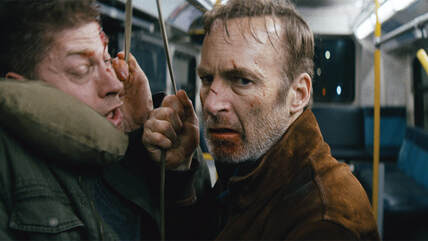Nobody provides Odenkirk with a Walter White-esque journey in its first act, fitting with Odenkirk’s prominent place in the Breaking Bad universe. Writer Derek Kolstad, who’s penned each John Wick movie, takes his time building all of Hutch’s frayed relationships and the indignities, real or perceived, that he endures. The film is best here in its shorthand about what’s expected from the American man. Huge numbers of Americans take the bus everyday, but the implication when Hutch does is that of a supplicant. Real men sit in traffic listening to classic rock. The break-in concludes with the cops openly wondering why Hutch didn’t murder two people in his home, a comment that would be on-the-nose if it weren’t exactly what I imagine plenty of cops, having sat through their killology classes, would ask. Odenkirk is an excellent vessel for all these slights, his stoop-shouldered posture weighted down by domestic expectations.
However, this is not a film that was made as an exploration of 21st century maleness. One of those bus rides, shared by Hutch, a young woman, and a gang of handsy besuited Russians, is the final straw. Windows are broken, handrails are removed, and violence is meted out. One of those Russians has a powerful father (Aleksei Serebryakov) and that’s the rest of Nobody. When the film inevitably gives itself over to the able stunt work of the John Wick school, something gets lost. Odenkirk proves to be a skilled physical actor, the Mankind to Reeves’ John Cena or some other athletic wrestler. He takes lots of punishment and deals more. However, Naishuller doesn’t have the chops of Leitch, whose best work was in Atomic Blonde. The bus fight provides a perfunctory amount of hand-to-hand, anything-goes fighting, but things quickly devolve into sloppy gun-kata whose appeal rests on how cool one thinks guns are. If the answer to that is not much, the conclusion becomes a deadening high-body-count slog and the film loses all its interest.
Nobody’s decline into generic action that’s itself a pale imitation of Hong Kong capers or even John Wick itself is most disappointing in how it displaces what Nobody had going for it. Setting aside the way that Hutch’s actions destroy any kind of vision his family had of him and the lack of engagement on this recalibration, Hutch’s transition from a ‘government auditor,’ as he describes himself, to a regular Joe is spurred by an act of mercy, wherein he spared a guy on his list. Hutch checked in on the guy some time later, and he was living an upright life, something that Hutch subsequently wondered if he could also have. Any time goons are given a face and a backstory and a general building out of their lives, however slight, it becomes impossible to take pleasure in their deaths and dismemberments. Nobody understands empathy towards desperate criminals, but it also wants to luxuriate in dispatching them. Can a person watch the Disney Star Wars movies once they understand that storm troopers are child soldiers, per the lore introduced in The Force Awakens? These films know that mowing down hundreds of red-shirts should mean something to their heroes, but they still have to have the action that puts butts in seats. The contradiction is especially present in Nobody. Odenkirk’s next old-man-action film might deal more effectively with this. His first one does not. C+

 RSS Feed
RSS Feed